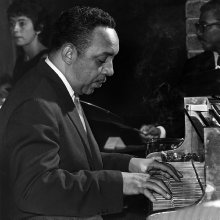|
Pianist Red Garland fit perfectly into the 1950s jazz mold, issuing smooth lines and rich chords that illuminated the tunes and the players around him. As far as I’m concerned, he’s forever an all-star for his role as Miles Davis’ sideman, and he amassed a hefty discography elsewhere. (My paltry selection below notwithstanding.) Garland remained committed to the standard jazz ethos throughout his career, and he died in 1984. Red Garland’s Piano Dec. 1956 & Mar. 1957 / Prestige The first time I heard this album, I missed having any horns, but upon further review, I learned to sink into Garland’s self-spinning piano trio world. Locked tightly with bassist Paul Chambers and drummer Art Taylor, Garland goes for miniscule nuances instead of grand dynamics in this selection of standards. The opening number is quite a statement though, an early soul number called “Please Send Me Someone to Love” that the trio takes at length, never losing the grip of its rootsy theme. After that come several classic tunes that function as either foreground studies or background finger snapping. The concisely percolating renditions of “Stompin’ at the Savoy” and “Almost Like Being in Love” are highlights, followed closely by “I Can’t Give You Anything But Love” and “But Not For Me”. On each, Red’s simultaneous juggling of harmonized phrases, bluesy substitutions, and signature block chords is effortless and impressive. You can also hear Red’s accompaniment chords arriving just ahead of the beat, creating a taut swing feel against Chambers’ on-the-dot basslines, and this is one of the things that made him such a great ensemble player, particularly with Miles Davis’ quintet. Speaking of which, Garland’s trio version of “If I Were a Bell” is decent but pales in comparison to the version he recorded with Miles.
The ballads “The Very Thought of You” and “I Know Why” drag a wee bit, as the typical ballad practice of the time was to keep a slow beat underneath the song, rather than take the opportunity for some rhythmic push and pull, as Bill Evans would do in his efforts soon to come. Nonetheless, Garland’s trio pays sufficient attention in these two selections, and who can complain about cocktail jazz when you’ve got a potent cocktail to match? This is a fine album overall, and the 2006 remaster sounds really nice. If you’re into this one, there’s another Garland reissue called Groovy worth checking out, too.
A straightahead good time - the apostrophe, personnel, and date tell you all you need to know. Donald Byrd and John Coltrane play trumpet and tenor above the rhythm trio of Garland, George Joyner, and Art Taylor. Coltrane and Garland were tight chums at the time, appearing on each other’s albums as well as having spilled blood together in Miles’ group, Prestigious incest that really clicks. Red’s piano playing is infectious as always; he gives his block chords and tight-knit lines a touch that makes everyone sound better. The title track is a twenty-minute, medium tempo blues with generous solos. Sustaining 12-bar interest for this long requires some dynamics (of which there are none) or else interesting players, and Coltrane for one fills that bill. The other soloists fall into enjoyable cliches and quotes. In one of his final choruses, Garland plays a lick that Trane would feature as his opening phrase in “Locomotion” on Blue Train, and that saxists from Jackie McLean to George Coleman would cop later on. If it’s a quote of a common tune, I’m blanking on what it is.
The standard showpiece “They Can’t Take That Away from Me” puts the emphasis on show, with Byrd taking the A sections and Trane handling the bridge, and a lively version of “Our Delight” completes the triptych. Coltrane fans will dig the album, provided his own large selection of Prestiges hasn’t quelled their appetite for his ‘50s playing.
|
